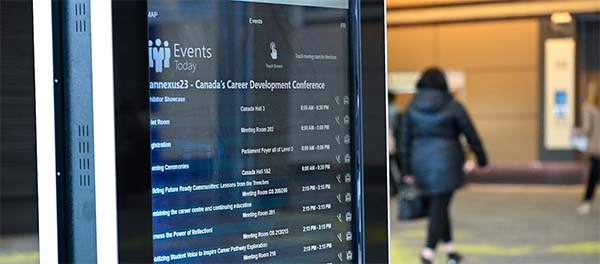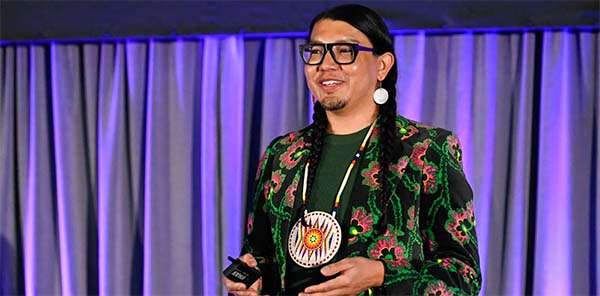Examining the Impact of Career Development at Cannexus 2023
27/02/2023
Jenny Gleeson is a multi-award winning coach and consultant with a strong focus on Aboriginal communities, not-for-profit organisations, youth services, and charities. Writing and self-publishing a resource guide called “Personalities in the Classroom”, she sold out her first print run within 6-months and is now negotiating a second edition with Personality Dimensions®. Jenny recently attended the Cannexus23 conference in Ottawa, Canada.

Photo by Fred Cattroll
Cannexus was everything I hoped it would be plus much more.
I have always wanted to go to Canada. Even though it has been on my Bucket List since I was 19, I never had a REALLY good reason to go, until I became a Career Coach and Canada was constantly brought up in conversations as being THE place to go regarding advancements in Career Development. It simply made sense to go to Canada’s biggest Career Development Conference in January 2023.
Cannexus, presented by CERIC, brought together those across the career and workforce development ecosystem to explore research, policy, and practice. The conference examined the impact of career development on education, the economy and social justice.
I made a beeline to workshops and sessions revolving about Aboriginal career development and was especially taken with several sessions focusing on this. Namely “Indigenous Workways: Making Space for Indigenous Employees” presented by Wendi Adair (University of Waterloo), Catherine Kwantes (University of Windsor), and Leanne Gosse (Conestoga College) who conducted community consultation, gathering in circles to discuss making space for Indigenous employees in the Canadian workplace.
We briefly shared what Indigenous employees told them about workplace relationships, conflict management, psychological and cultural safety, and career mentorship. They introduced me to the Hands Forward/Hands Backwards Approach; reaching out backwards with our hands up to receive information from the past, then reaching out forward with our hands down to hold the hands of those we pass knowledge onto.
The Keynote Address was given by Dr James Makokis who identifies as a Two-Spirit. Dr. Makokis has an incredible first-hand experience in growing up as a Two-Spirit in a segregated and marginalised community. The term ‘Two-Spirit’ is a term used with some Indigenous communities, encompassing cultural, spiritual, sexual and gender identity. The term reflects complex Indigenous understandings of gender roles, spirituality and the long history of sexual and gender diversity in Indigenous cultures.

Photo by Fred Cattroll
Dr. Makokis has one of the most unique perspectives on the importance of acceptance and equal treatment regarding cultural, gender, sexuality, and racial differences. Canada is one of the most diverse countries in the world, yet many individuals face personal challenges in achieving success. Dr. Makokis combined his story with practical insights on how to create accepting spaces where EVERYONE can prosper by incorporating an accepting attitude to anyone that is outside of social norms.
Dr. Makokis shared how to identify and acknowledge our unconscious bias, which often creates and reinforces stereotypes and stigmas which then negatively impact our relationships. Dr. Makokis teaches how to become an ally to refocus our relationships to be accepting, safe and supportive. This presentation provided key learnings that work to create new inclusive programs for diverse populations.
Then I attended one of the most controversial sessions I have ever attended. And I was impressed, to say the very least. “Smoke and Mirrors, The Illusion of the Employment Services Sector” presented by Sarah Delicate and Angela Hoyt, pulled back the curtain on the dark side of outcome based, government-funded employment services and exposed the fact, that despite the billions invested, the sector itself has become a significant barrier to employment for underrepresented groups.
Sarah and Angela made this session a highly interactive session with audience participation. We were encouraged to vote and respond to issues we had all come across in the sector. I was shocked and disturbed to see that the issues raised, and responses received were the same as in Australia. This is a MUST view (only 55 seconds) which exposes the fact that all the players in the system, are complicit.
The final session I went to was the KAIROS Blanket Exercise, which was presented by a father and son. This was a highly engaging and eye-opening experience for me as they explored the historic and contemporary relationship between Indigenous and non-Indigenous peoples in Canada.
It was an interactive learning experience that built participant awareness and understanding of their shared history by having us literally walk through situations that include pre-contact, treaty-making, colonisation and resistance. We stepped onto blankets representing the land, and into the role of First Nations, Inuit and later Métis peoples. It was powerful and distressing to physically be a part of the exposure of Canadian peoples’ history and realise just how horribly similar it is to our Aboriginal peoples’ experiences.
And last but definitely not least, was the time that I spent with Brad Whitehorn, the Associate Director of CLSR, publishers of Personality Dimensions, my most favourite tool ever! Even though we haven’t quite gotten there YET with Personality Dimensions in Australia, I was relieved to meet so many Career Practitioners in Canada who utilise the tool. Nearly every second person I spoke to (and there were 900+ delegates there) had either participated in a Personality Dimensions workshop, had used the online resources, or were a Level I, II or Master Facilitator.
They embed it in the university curriculum, secondary school curriculum, with CEOs, in the emergency services, one on one career coaching sessions, in community, with For Purpose Organisations (like Australia’s Not for Profit sector) and the list went on and on. It was refreshing not to have to try and convince people of how amazing this tool is. If you would like to hear from Brad, feel free to read his post.
Overall, I have to admit that I LOVE Canada, the people (who constantly seem to feel the need to apologise – not sure why), the snow (first time I have ever seen snow fall), the food (including a drink called a Caesar made out of clam juice) and the general beauty of the country. I came back inspired and motivated to work even closer with the Personality Dimensions tool and our Aboriginal people, who I admire, trust and respect so deeply.
Since returning home, I have been asked to deliver a two-day workshop in Sydney for the Aboriginal Language Trust, and have been asked to submit a joint abstract with Keipa Boojda Aboriginal Corporation for the AIATSIS Summit in June 2023. It warms my heart to think that I am helping make change.